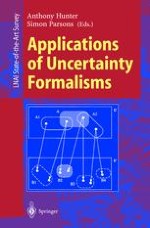1998 | OriginalPaper | Chapter
Handling imperfect knowledge in Milord II for the identification of marine sponges
Authors : Marta Domingo, Lluís Godo, Carles Sierra
Published in: Applications of Uncertainty Formalisms
Publisher: Springer Berlin Heidelberg
Included in: Professional Book Archive
Activate our intelligent search to find suitable subject content or patents.
Select sections of text to find matching patents with Artificial Intelligence. powered by
Select sections of text to find additional relevant content using AI-assisted search. powered by
In this chapter we present SPONGIA, a knowledge based system implemented using the Milord II programming environment. SPONGIA deals with the identification of sponges from the Atlanto-Mediterranean biogeographical province. It covers the identification of more than 100 taxa of the phylum Porifera from class to species. The effective handling of uncertainty has been critical to display an efficient performance in SPONGIA. This problem has been managed taking advantage of the multiple techniques provided by Milord II. The use of fuzzy logic makes it possible to accurately represent the imprecise knowledge which constitutes the classificatory theory of Porifera to a large extent. It also provides the user with some means of expressing his state of knowledge with accuracy. Easy design and incremental development of the knowledge base are possible thanks to modularity. Taxonomic knowledge is represented by means of plain modules hierarchically interconnected via submodule declarations and refinement operations. To emulate the reasoning strategies we use generic modules, which can take other modules as parameters. Thanks to the uncertainty handling and reflective deduction mechanisms it has been possible to emulate complex reasoning strategies displayed by experts in sponge systematics. Finally, the strict compartmentation of domain knowledge and knowledge concerning reasoning strategies into modules allows the reusability of pieces of knowledge.
